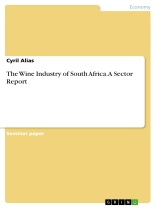Seminar paper from the year 2005 in the subject Business economics – General, grade: 1, 0, University of Applied Sciences Bielefeld, course: Internationale Wirtschaftsbeziehungen, language: English, abstract: Although South Africa was not very famous for its beverages, esp. its wines, for long times and has gained fame in recent years only, the heritage of its vine-growing culture goes back to the mid of the 17th century. European settlers, predominantly from The Netherlands, started to plant first seedlings in the Cape region. It was Jan van Riebeeck, founder of the Cape colony, who brought the seedlings along from Europe in 1655.
Some four years later, the first South African wine was ready to be drunk. However, as the Dutch were not too experienced with viticulture, real development took place only when French Huguenots settled in that region in the end of the 17th century.
In the mid of the 18th and the beginning of the 19th century, these wines (e.g. the very sweet Constantia wines) were very popular all around Europe, particularly in the royal houses. But afterwards, the demand shrank to nearly zero. In 1973, viticulture was resumed in the African country. However, the wines were boycotted by the rest of the world due to the Apartheid problems within the country.
Only from 1990 onwards, South African wine industry is recovering and nowadays belongs to the so-called “New World wines”, which also include products from Chile, Argentina, Australia, New Zealand and the United States (California).
Cyril Alias
The Wine Industry of South Africa. A Sector Report [PDF ebook]
The Wine Industry of South Africa. A Sector Report [PDF ebook]
Mua cuốn sách điện tử này và nhận thêm 1 cuốn MIỄN PHÍ!
Ngôn ngữ Anh ● định dạng PDF ● ISBN 9783656957232 ● Kích thước tập tin 0.6 MB ● Nhà xuất bản GRIN Verlag ● Thành phố München ● Quốc gia DE ● Được phát hành 2015 ● Phiên bản 1 ● Có thể tải xuống 24 tháng ● Tiền tệ EUR ● TÔI 5239671 ● Sao chép bảo vệ không có












